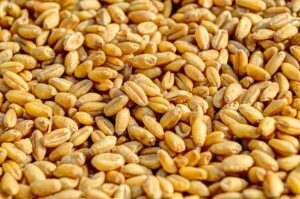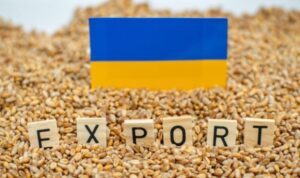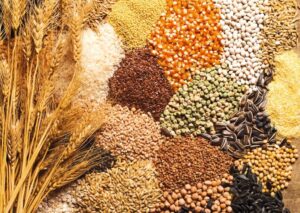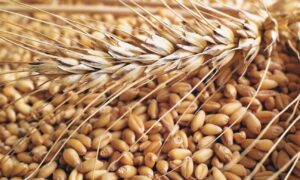
In March, Ukraine exported 1.1 million tons of wheat, which is one of the highest monthly figures of the current season, in April, the volume of supplies may be slightly lower, but still remain at a high level, according to the analytical cooperative “Start”, created within the framework of the All-Ukrainian Agrarian Council.
“For April, 850 thousand tons of wheat have already been contracted, and the total monthly exports may reach 1 million tons. Despite the general stagnation of demand in the European market, Ukrainian grain is finding its buyers, particularly in Egypt,” analysts said.
However, according to experts, the situation is less optimistic from the price point of view. The main export destinations for Ukrainian wheat – Italy, Spain, and the Netherlands – remain passive in terms of new purchases, and the reintroduction of duties on Ukrainian grain to the EU in June may further complicate access to the European market.
“There is no positive news for the wheat price so far. The stock market has been sinking in recent weeks, and we see a serious gap between the physical market and stock exchange quotes. While the FOB price in Ukraine is currently $60 per ton higher than in Chicago, by June-July the markets usually synchronize. This means that the Ukrainian physical price may sink, especially as the new harvest approaches,” Pusk commented.
According to analysts, the conditional average price for wheat of the 2nd class of the new harvest for July is forecasted at $190-200 per ton on a CPT-port basis, while currently this figure is fixed at $210-215. The potential decline could be up to $20 per ton.
“If you have the opportunity, you should not rush to sell. Historically, in July-August, the market is saturated with wheat from all major exporting countries – Ukraine, Russia, Romania, and the US – and even with a deficit balance, the price usually falls. At the same time, the seasonal model shows that from October to December, the price may rise to $220-235 per ton on a CPT-port basis. Therefore, if the financial cushion allows, it is worth considering postponing sales,” the analysts added.
They stated that flour mills are currently offering the best prices on the domestic market – 10500-11000 UAH/ton for 2-3 grade wheat.
“Given the sluggish export demand, this may be a more profitable solution for farmers,” Pusk believes.

In March 2025, Ukraine exported 5.4 million tons of agricultural products, which is 9.8% more than the same indicator of the previous month, according to the Ukrainian Agribusiness Club (UCAB).
All groups of goods showed growth compared to the previous month, but the largest increase was in oilseed processing products, namely oilcake and oil, whose exports increased by 42% and 29%, respectively, analysts said.
According to their information, in February 2025, the structure of agricultural exports was dominated by cereals, which were supplied to foreign markets in the amount of 3.6 mln tons, which is 5% more than a month earlier. At the same time, corn accounted for 66% of exports, wheat – 31%, and barley – 2%.
At the same time, in March 2025, the export volumes of oilseeds increased by 4% to 433.6 thsd tonnes (soybean – 85%, rapeseed – 7% and sunflower – 6%), and by 29% of vegetable oils – to 495.6 thsd tonnes. tons (sunflower oil – 89% and soybean oil – 11%), by 11% of cake after extraction of vegetable oils – to 493.5 thousand tons (sunflower oil – 70%, soybean oil – 30%), by 11% of other agricultural products – to 363.2 thousand tons.

The total volume of foreign trade in dairy products in February 2025 amounted to $45.6 million, which is 8.5% more than in January 2025 ($42.0 million) and 16.4% lower than in December 2024 ($54.5 million), according to the Union of Dairy Enterprises of Ukraine (UDEP).
According to the report, dairy exports in February 2025 amounted to $24.2 million and increased by 25% compared to January 2025 ($19.3 million) and by 51% compared to December 2024 ($16.0 million).
“Such significant export volumes have not been recorded since October-2022,” the analysts emphasized.
According to them, the value structure of exports was formed as follows: 36% milk and condensed cream, 30% butter, 20% cheese.
At the same time, in February 2025, compared to February 2024, the value structure of exports changed slightly: the share of butter and milk fats increased (from 13% to 30%), while the share of cheeses of all kinds decreased (from 28% to 20%) and milk and cream not condensed (from 10% to 6%).
At the same time, imports continued to decline and became the lowest in the last six months: in February 2025, they amounted to $21.4 million, which is 6% lower than in January 2025 ($22.7 million) and 44% lower than in December 2024 ($38.5 million).
In addition, in February 2025, compared to February 2024, there were changes in the value structure of imports: the share of cheese increased (from 68.2% to 83.4%) against a significant decrease in the share of butter (from 16.5% to 2.4%). The share of cheese (83.4%) reached its highest level in recent years.
The balance of exports and imports in February 2025 was positive: $2.8 million, compared to -$3.4 million in January 2025 and -$22.6 million in December 2014.
In February 2025, exports in value terms exceeded imports by 13% (in January 2025 – 0.85 times, in December 2024 – 0.41 times).

Exports of Ukrainian agricultural seeds have increased more than sixfold over the past five years, reaching $122 million in monetary terms from the initial $20 million, according to Oleksandr Zakharchuk, head of the investment and logistics department at the National Research Center “Institute of Agrarian Economics”.
“In 2025 and the following years, the existing trends are to increase exports by 10-15% annually and stabilize imports of agricultural seeds at the level of $350-400,” he said.
The scientist is convinced that the decrease in imports of grain and oilseed seeds is due to a number of factors, including the ability to produce conditioned hybrid seeds of foreign selection in Ukraine at new modern seed plants in Ukraine. This will be enough to meet both domestic needs and export to the EU.
In addition, he pointed to a decrease in seed consumption due to the reduction of commercial crops caused by Russia’s large-scale armed aggression against Ukraine, in particular, the temporary occupation of its territories and military operations.
“The consequences of Russia’s full-scale invasion of Ukraine, in particular, the temporary occupation of its territories, led to an increase in the plantings of certain niche grains and oilseeds. This, in turn, has led to an increase in imports of seeds of such crops as rye, oats, sorghum, flax, hemp, mustard, as well as sugar beets and vegetables in the period 2022-2024,” Zakharchuk stated.

As of March 28, Ukraine exported 32.389 mln tonnes of grains and pulses since the beginning of 2024-2025 marketing year (MY, July-June), of which 3.206 mln tonnes were shipped this month, the press service of the
Ministry of Agrarian Policy and Food reported citing the State Customs Service.
According to the report, as of the same date last year, the total shipments amounted to 34.199 mln tons, including 4.529 mln tons in March.
In terms of crops, since the beginning of the current season, Ukraine has exported 12.997 mln tons of wheat (994 thsd tonnes in March), 2.206 mln tons of barley (62 thsd tonnes), 10.8 thsd tonnes of rye (0), and 16.72 mln tons of corn (2.14 mln tonnes).
The total export of Ukrainian flour since the beginning of the season as of March 28 is estimated at 53.1 thsd tonnes (in March – 4.5 thsd tonnes), including 49.2 thsd tonnes of wheat (4.4 thsd tonnes).

According to EastFruit analysts, a historic event took place in 2024: Ukraine, which practically did not export frozen raspberries ten years ago, for the first time became the world leader in terms of net exports of this berry, surpassing not only Poland but also Serbia, the long-time leader in this segment.
In 2024, according to trade statistics, Ukraine’s exports of frozen raspberries reached a record 65 thousand tons, showing a 34% increase over the year. This was a much faster increase than any other major exporter. In general, over the past three seasons, Ukraine’s exports of frozen raspberries have more than doubled, while Serbia has maintained its performance at the same level and Poland has reduced its exports by 24%.
It is worth noting that Ukraine imports only small volumes of raspberries, unlike Serbia and especially Poland, which actively purchase them abroad. In Polish exports, the share of imported raspberries already exceeds 52%, with the bulk of Poland’s purchases coming from Ukraine. In fact, almost half of the frozen raspberries exported by Poland are of Ukrainian origin. It is the affordable Ukrainian raspberries that allow this country to maintain its position among the world market leaders.

If we analyze net exports, Ukraine supplies 65 thousand tons of frozen raspberries to foreign markets, while Poland supplies only about 16 thousand tons. Thus, in 2024, Ukraine exported four times more frozen raspberries than Poland!
Interestingly, in terms of total exports of frozen raspberries, Ukraine is still slightly behind Serbia. In 2024, Serbia exported 67.7 thousand tons of raspberries, while Ukraine exported 65.1 thousand tons. However, Serbia imported 4.7 thousand tons for further re-export, which reduced its net exports to 63 thousand tons, which is 2 thousand tons less than Ukraine.
“The key step to consolidating Ukraine’s global leadership in frozen raspberry exports will be further diversification of sales markets. To do this, Ukrainian exporters need to improve the quality of raspberries and invest in their processing and marketing, which will help to increase the average export price. Higher export revenues could be used to improve products, increase their quality, and expand production. Currently, many Ukrainian producers of frozen berries export to Poland the raw materials that Polish processors sort, pack and re-export, leaving the added value in their country,” says Andriy Yarmak, economist at the FAO Investment Department.

The process of diversification of frozen raspberry exports from Ukraine is already underway. It is noteworthy that Poland played a significant role in this. Farmers’ protests against imports of raspberries and other agricultural products forced Ukrainian exporters to look for new markets, which turned out to be much more profitable than the Polish market. The additional income of Ukrainian raspberry producers was reinvested in expanding production and processing in Ukraine, which accelerated Ukraine’s ascent to the global raspberry export Olympus.
Between 2022 and 2024, Poland’s share of Ukrainian raspberry exports decreased from 63% to 35%. Instead, the share of Germany, the Czech Republic, Austria, and France, key markets for Polish exporters, more than doubled to 48% of direct exports from Ukraine. Ukraine is actively gaining market share in Poland, which has been made possible by improving the quality of its products and the level of their processing.
Over the past three years, Ukraine’s exports of frozen raspberries to Germany have increased 4.5 times, to the Czech Republic 4.2 times, to Austria 33 times, and to France twice. In 2024, Ukraine also exported over 2,000 tons of raspberries to Belgium, Italy, and Lithuania for the first time.
In addition, Ukraine is rapidly increasing its exports of frozen raspberries to Canada and the United States, markets that offer much higher prices than the EU. Three years ago, Ukraine did not supply products to these countries, and now it often outperforms its Polish competitors in terms of exports.
Among the unusual export destinations for frozen raspberries, it is worth noting the first commercial deliveries of Ukrainian products to Argentina and Saudi Arabia.
Given the high prices for raspberries in the previous season, EastFruit analysts predict that in 2025 and in the 2025/26 season, Ukraine will update its raspberry export records and strengthen its leadership. In particular, already in 2025, Ukraine may overtake Serbia in terms of total exports of frozen raspberries.